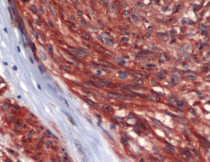ARG52673
anti-CD117 / c-Kit antibody
anti-CD117 / c-Kit antibody for ICC/IF,IHC-Formalin-fixed paraffin-embedded sections and Human
Cancer antibody; Controls and Markers antibody; Developmental Biology antibody; Immune System antibody; Neuroscience antibody; Signaling Transduction antibody
Overview
| Product Description | Rabbit Polyclonal antibody recognizes CD117 / c-Kit |
|---|---|
| Tested Reactivity | Hu |
| Tested Application | ICC/IF, IHC-P |
| Host | Rabbit |
| Clonality | Polyclonal |
| Isotype | IgG |
| Target Name | CD117 / c-Kit |
| Antigen Species | Human |
| Immunogen | Synthetic peptide from the cytoplasmic domain of human CD117/c-kit protein. |
| Conjugation | Un-conjugated |
| Alternate Names | PBT; C-Kit; Tyrosine-protein kinase Kit; CD antigen CD117; Mast/stem cell growth factor receptor Kit; CD117; Proto-oncogene c-Kit; SCFR; Piebald trait protein; v-kit Hardy-Zuckerman 4 feline sarcoma viral oncogene homolog; p145 c-kit; EC 2.7.10.1 |
Application Instructions
| Application Suggestion |
|
||||||
|---|---|---|---|---|---|---|---|
| Application Note | IHC-P: Antigen Retrieval: Boil tissue section in 10mM citrate buffer, pH 6.0 for 10 min followed by cooling at RT for 20 min. Incubation Time: 10 min at RT. * The dilutions indicate recommended starting dilutions and the optimal dilutions or concentrations should be determined by the scientist. |
||||||
| Positive Control | Gastrointestinal Stromal Tumor |
Properties
| Form | Liquid |
|---|---|
| Purification | Immunogen affinity purified |
| Buffer | PBS (pH 7.6), 1% BSA and < 0.1% Sodium azide |
| Preservative | < 0.1% Sodium azide |
| Stabilizer | 1% BSA |
| Storage Instruction | For continuous use, store undiluted antibody at 2-8°C for up to a week. For long-term storage, aliquot and store at -20°C or below. Storage in frost free freezers is not recommended. Avoid repeated freeze/thaw cycles. Suggest spin the vial prior to opening. The antibody solution should be gently mixed before use. |
| Note | For laboratory research only, not for drug, diagnostic or other use. |
Bioinformation
| Database Links |
Swiss-port # P10721 Human Mast/stem cell growth factor receptor Kit |
|---|---|
| Background | Recognizes a protein of 145kDa, which is identified as CD117/p145kit. This rabbit polyclonal antibody does not interfere with the binding of SCF to c-kit. It precipitates both the unoccupied as well as the occupied form of c-kit. The binding of the stem cell factor (SCF) to the c-kit-encoded receptor tyrosine kinase (Type III) stimulates a variety of biochemical responses that culminate in cellular proliferation, migration, or survival. C-kit plays an important role in hematopoiesis, melanogenesis, and gametogenesis. |
| Cellular Localization | Cytoplasm |
| Research Area | Cancer antibody; Controls and Markers antibody; Developmental Biology antibody; Immune System antibody; Neuroscience antibody; Signaling Transduction antibody |
| Calculated MW | 110 kDa |
| PTM | Ubiquitinated by SOCS6. KIT is rapidly ubiquitinated after autophosphorylation induced by KITLG/SCF binding, leading to internalization and degradation. Autophosphorylated on tyrosine residues. KITLG/SCF binding enhances autophosphorylation. Isoform 1 shows low levels of tyrosine phosphorylation in the absence of added KITLG/SCF (in vitro). Kinase activity is down-regulated by phosphorylation on serine residues by protein kinase C family members. Phosphorylation at Tyr-568 is required for interaction with PTPN11/SHP-2, CRK (isoform Crk-II) and members of the SRC tyrosine-protein kinase family. Phosphorylation at Tyr-570 is required for interaction with PTPN6/SHP-1. Phosphorylation at Tyr-703, Tyr-823 and Tyr-936 is important for interaction with GRB2. Phosphorylation at Tyr-721 is important for interaction with PIK3R1. Phosphorylation at Tyr-823 and Tyr-936 is important for interaction with GRB7. |
Images (1) Click the Picture to Zoom In








